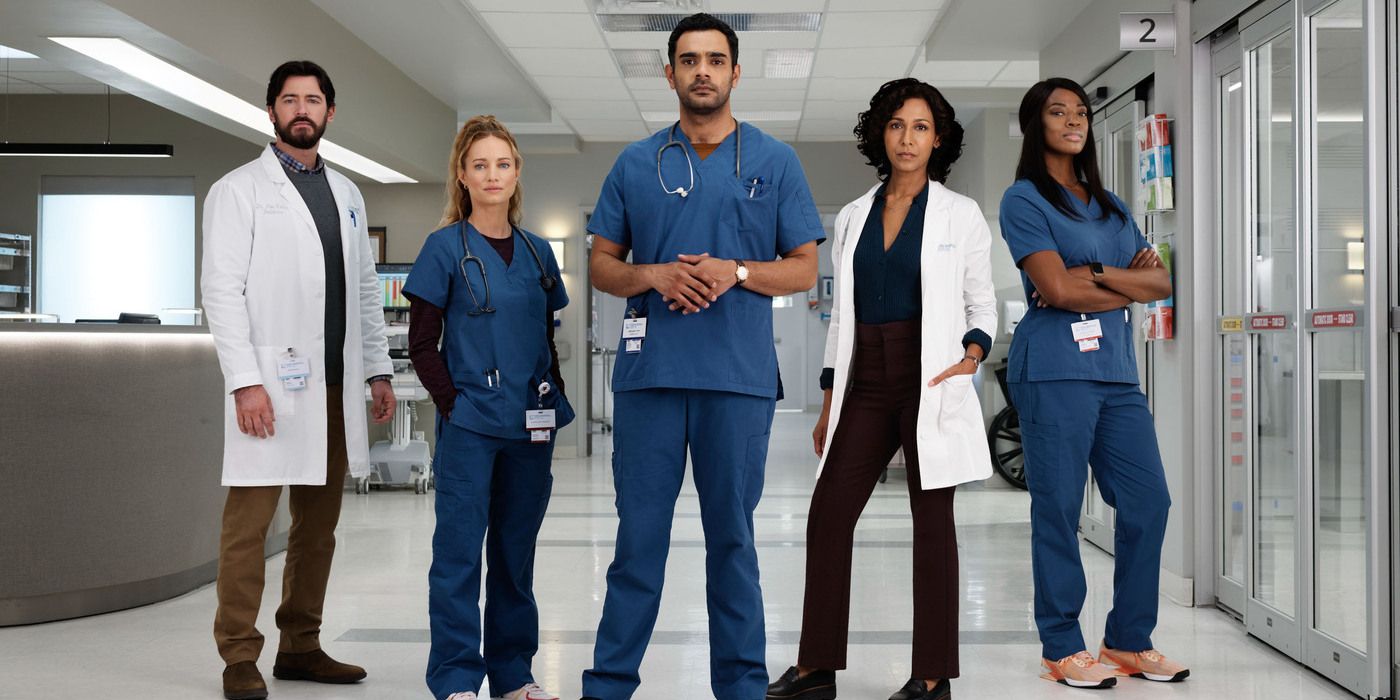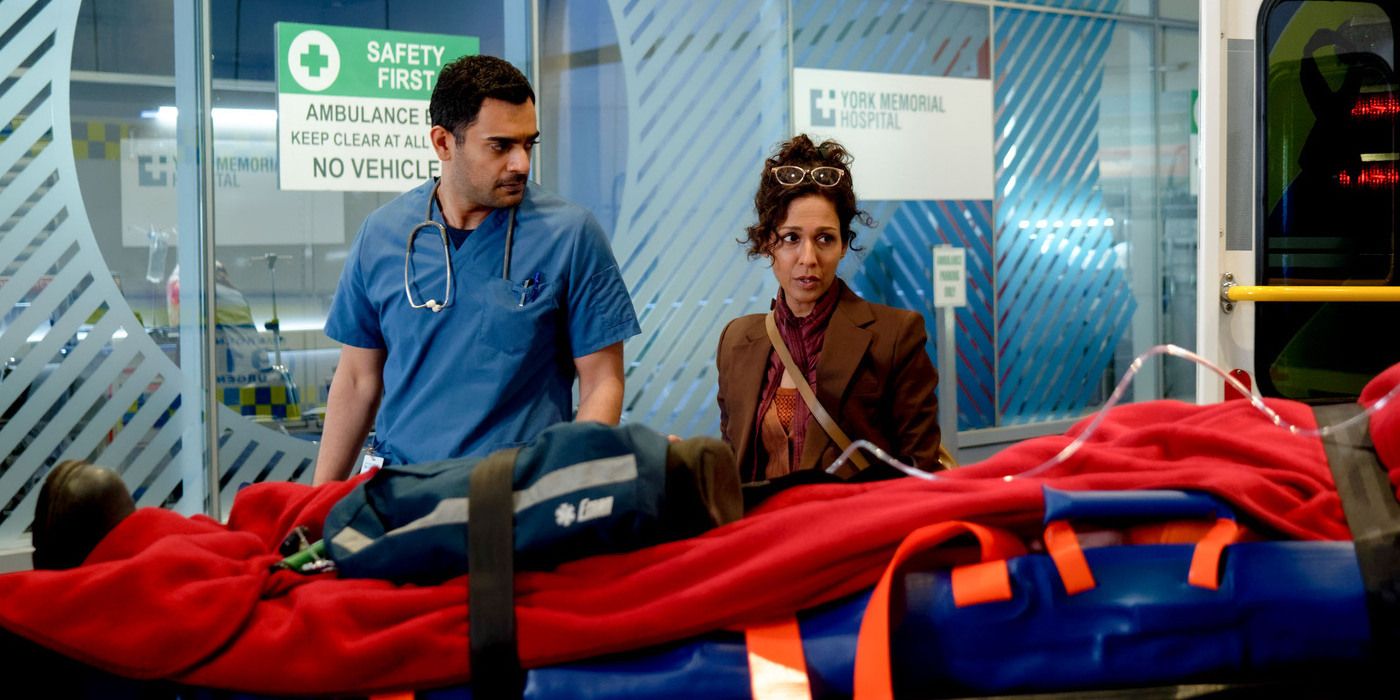Transplant Season 3 is coming to NBC with multiple cliffhangers to resolve. The Canadian medical drama left off with a shocking helicopter crash, the emotional departure of one of its founding characters and Bash reaching a crossroads in his dynamic with Mags. The entire series seemed set to turn on its head -- so should viewers expect more surprises in the new season? And what lies ahead at York Memorial Hospital after all those questions are resolved?
CBR spoke to Transplant creator Joseph Kay about the rationale behind some of those major storytelling decisions, as well as what he feels separates the show from the crowded field of TV medical dramas. He also discussed another choice not so far off in the future: getting to the end of Bash's story. Transplant Season 3 premieres Thursday, Oct. 12 at 9:00 p.m. on NBC, with Seasons 1 and 2 streaming on Peacock.
CBR: You made some very big storytelling moves in the Season 2 finale, and there are other important developments in the Transplant Season 3 premiere. Will audiences see some of these changes continue to play out across the season, or does the first episode resolve most of those big questions?
Joseph Kay: We definitely see the aftereffects play out [in future episodes]. We ended Season 2 on three major cliffhangers: Dr. Bishop leaving the hospital, the helicopter crash for Theo, and Bash coming to Mags' apartment. In all three cases, we invest in those as big stories for the third season. We bring in a new boss, Dr. Devi, played by [Roswell, New Mexico actor] Rekha Sharma, who changes the dynamic of the hospital. Theo survives, and we take our time figuring out what the impact of that crash is on him as a person. And the relationship between Bash and Mags is something that we really invest in for the third season.
Seeing Bishop leave York Memorial was heartbreaking, especially because Agents of SHIELD alum John Hannah brought so much to Transplant. What was the rationale behind writing out Bishop and bringing in Dr. Devi?
We love John Hannah so much. He is such a great actor and a great guy. [But Bishop] has this strong father figure role in Bash's life. Bash needs to be threatened as a character; he needs to be destabilized as a character for us to have the stakes that we need. And after everything that we explored between Dr. Bishop and Bash over two seasons, it's almost too safe there for Bash with Bishop. He has this person who always have his back. We'd come up with three or four or five different ways to ignite conflict [between them] and we really didn't want to repeat ourselves...And we wanted Bash to never feel too safe. Although it really pained us to write a character like that and an actor like that off the show, it was something that we just needed to do.
Yet it's not simply that Bash has a new boss; Devi comes with a very different approach to medicine. What does that mean for Transplant as a whole? Should viewers expect Season 3 to have changes in the kind of stories it tells or how the characters handle those stories?
She comes with change. She destabilizes things in an antagonizing way -- but she's not a villain. She's the kind of character that you want to root for, because her heart is in the right place. She has big ideas for change from a humanist perspective, from a patient-first perspective, from an advocacy perspective. She wants to make the hospital experience better and more engaged...But the reality is big institutions like big pharma and major city hospitals are really hard to change.
What happens is there are reverberations from her attempts to bring change. It affects each of our characters in different ways. But at the same time, we're rooting for Dr. Devi because she's a good person. You want to see her succeed, but you're also wishing she wasn't making life harder. It was a fun thing to write for and produce, and we were lucky to have an actor like Rekha, who was able to give us that range -- that heartfelt emotion while not being afraid of being difficult. Sometimes we're affecting our core cast in ways that challenge them.
Underneath all the hospital drama is Bash's individual story of moving toward citizenship, which is also prominent in the Season 3 premiere. That's a storyline not only unique in the medical drama space but uncommon on TV as a whole. What was it like to push that story forward in Season 3, and to continue to weave that narrative over so many years?
We were very proud and excited for that storyline. One of our writers, Ahmad Maree, he's a Syrian refugee in Canada, and a writer and a playwright and an actor. And while we were writing in Season 3, he was going through the exact experience as a Syrian becoming a Canadian. He very graciously [would] talk about the [citizenship] process, both bureaucratically and emotionally. It's not something you really see on television. And it's interesting dramatically in terms of what the steps are, and how you go through it.
For Bash, he doesn't know who he is. He's excited to become Canadian; there are so many benefits to becoming a Canadian or an American. But he also feels himself losing sight of who he thought he was. That's happening on a practical level -- as you sort of have to give up one nationality and gain another -- and it's happening on an emotional level. And we're telling that story for Bash across multiple storylines. It's a similar thematic story that we're telling when Bash wants to become a surgeon again, or when Bash tries to see who he is in his relationship with Mags, or as a parent. It's both practically and emotionally a novel and exciting place to be. And in this season, we return to it again and again, as he goes through the process.
Another aspect that sets Transplant apart is that you've avoided most of the melodramatic storytelling other medical dramas often face. How have you been able to sidestep those pitfalls while still maintaining audience interest?
We try really hard to make sure every medical story is about our doctors. Een though the patients are there, it's not about them. They're just there to kind of mirror what's going on with our core cast. This is about a guy who fell off a roof, but what is it really about for Bash? We're constantly asking ourselves the question, how can we emotionally surprise ourselves with these characters? And we also just want to let go of any rules. It's a network drama, and it needs to exist on the networks in the United States and in Canada, and kind of do those things that they need to do. But if there are rules out there, that we think we have to follow as writers, how can we let ourselves not follow them and see what happens? It's keeping the emotion about the main characters, and that makes Transplant, Transplant.
You've been very open about planning the show to end with Season 4. NBC viewers are starting Season 3, so they'll be seeing the beginning of the end in some ways. What does it mean to you to be able to complete Bash's journey, but also having that second life as the American audience is still discovering the series?
Really proud and excited that we set out to tell a complete story and that we're ending it on our own terms -- when we wanted to, in the way we wanted to. I love making the show, and it's a real big part of me and the people who make it alongside of me. It's hard to let go of, so it's an emotional experience of doing this thing and seeing it out there in the world and then saying goodbye to it. Right now we're filming Season 4 in Montreal; it's going to be launching on television in Canada shortly. So on the one hand, I'll be saying goodbye to it here, but [Season 3 is] only launching in the US now. I get to extend my half life with Transplant quite a while because of that time difference... But happy with everything that we've done and really proud of it.
Transplant Season 3 premieres Thursday, Oct. 12 at 9:00 p.m. on NBC.


